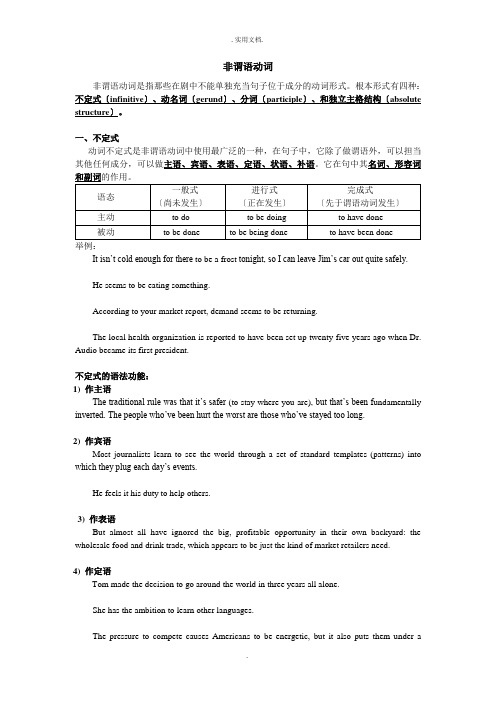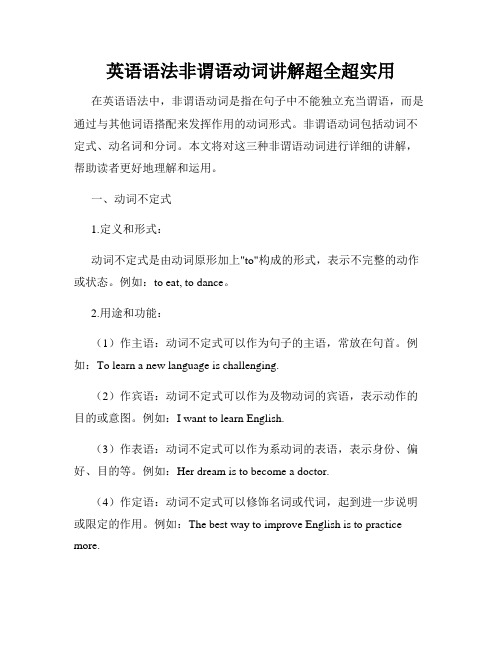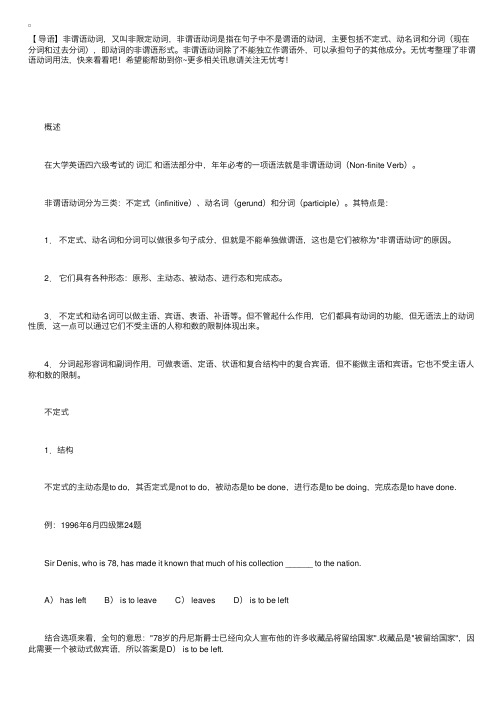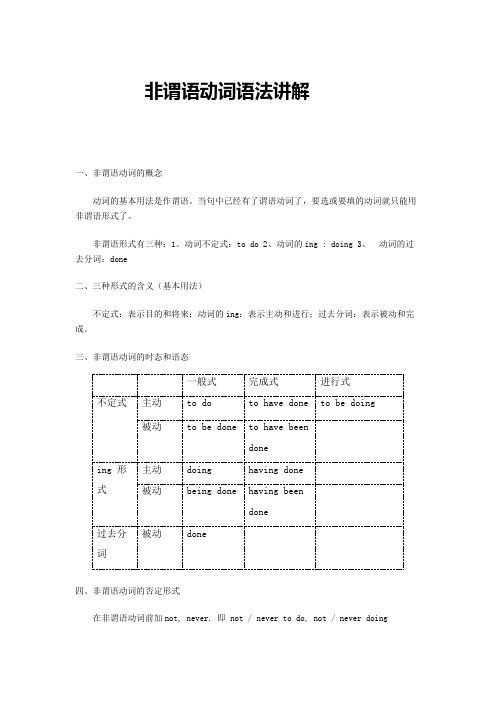GCT 语法-非谓语动词(05)
高中英语语法 非谓语动词 全

非谓语动词非谓语动词。
在英语中,不能作句子谓语,而是担任其它语法功能的动词叫做非谓语动词。
非谓语动词的时态和语态的不同形式动词不定式动名词分词主动to do doing doing(同时,主动)被动to be done being done done(被动,完成)进行主动to be doing进行被动being done进行,被动主动完成to havedone having done having done(主动,完成一般作状语)被动完成to havebeen done having beendonehaving beendone(被动,完成一般作状语)非谓语动词在句中的作用主语宾语表语补语定语状语不定式√√√√√√动名词√√√√分词√√√√一:分词(现在分词和过去分词,分别表示:主动,行进&被动,完成)1)作定语The girl standing by the window is my sister.=The girl who is standing by the window is my sister.This is a book written by a famous Chinese writer.= This is a book which was written by a famous Chinese writer.2) 作状语(一般表示时间,原因,条件,伴随)有时可将从句中when/while /unless/if 等保留(While/When)Walking in the street ,I saw her.=While/When I was walking in the street ,I saw her.(表示时间)Seen from the hill,our school looks more beautiful.=When our school is seen from the hill,it looks more beautiful.从小山上看,我们学校更美了。
考研英语语法之非谓语动词

非谓语动词非谓语动词是指那些在剧中不能单独充当句子位于成分的动词形式。
根本形式有四种:不定式〔infinitive〕、动名词〔gerund〕、分词〔participle〕、和独立主格结构〔absolute structure〕。
一、不定式动词不定式是非谓语动词中使用最广泛的一种,在句子中,它除了做谓语外,可以担当其他任何成分,可以做主语、宾语、表语、定语、状语、补语。
它在句中其名词、形容词举例:It isn’t cold enough for there to be a frost tonight, so I can leave Jim’s car out quite safely.He seems to be eating something.According to your market report, demand seems to be returning.The local health organization is reported to have been set up twenty-five years ago when Dr. Audio became its first president.不定式的语法功能:1) 作主语The traditional rule was that it’s safer (to stay where you are), but that’s been f undamentally inverted. The people who’ve been hurt the worst are those who’ve stayed too long.2) 作宾语Most journalists learn to see the world through a set of standard templates (patterns) into which they plug each day’s events.He feels it his duty to help others.3) 作表语But almost all have ignored the big, profitable opportunity in their own backyard: the wholesale food and drink trade, which appears to be just the kind of market retailers need.4) 作定语Tom made the decision to go around the world in three years all alone.She has the ambition to learn other languages.The pressure to compete causes Americans to be energetic, but it also puts them under aconstant emotional strain.5) 作状语A sad thing about life is when you meet someone and fall in love, only to find out in the end that you have wasted years on someone who wasn’t worth it.6) 作补语The man was seen to fall heavily to the ground and never get up again.注:使役动词如make、let、have等以及感官动词hear、see、feel、watch、notice等之后所加的不定式要省略to,但是在被动语态中不可省略。
英语语法非谓语动词讲解超全超实用

英语语法非谓语动词讲解超全超实用在英语语法中,非谓语动词是指在句子中不能独立充当谓语,而是通过与其他词语搭配来发挥作用的动词形式。
非谓语动词包括动词不定式、动名词和分词。
本文将对这三种非谓语动词进行详细的讲解,帮助读者更好地理解和运用。
一、动词不定式1.定义和形式:动词不定式是由动词原形加上"to"构成的形式,表示不完整的动作或状态。
例如:to eat, to dance。
2.用途和功能:(1)作主语:动词不定式可以作为句子的主语,常放在句首。
例如:To learn a new language is challenging.(2)作宾语:动词不定式可以作为及物动词的宾语,表示动作的目的或意图。
例如:I want to learn English.(3)作表语:动词不定式可以作为系动词的表语,表示身份、偏好、目的等。
例如:Her dream is to become a doctor.(4)作定语:动词不定式可以修饰名词或代词,起到进一步说明或限定的作用。
例如:The best way to improve English is to practice more.(5)作状语:动词不定式可以表示时间、目的、方式等状语的作用。
例如:I went to the park to relax.3.特殊用法:(1)省略to:在某些情况下,不定式的to可以省略,例如在助动词let、make、help等后面。
例如:Let me go.(2)动词不定式的时态:动词不定式没有人称和数的变化,但可以根据不同的时间来使用不同的时态。
例如:I want to go shopping.(现在时态)I wanted to go shopping.(过去时态)二、动名词1.定义和形式:动名词是由动词加上-ing构成的形式,可以作为名词使用。
例如:swimming, running。
2.用途和功能:(1)作主语:动名词可以作为句子的主语,常放在句首。
[新版]gct语法演习
![[新版]gct语法演习](https://img.taocdn.com/s3/m/78a31dee10a6f524cdbf853a.png)
语言知识部分讲课内容第一讲第一节时态第二节语态第二讲第一节虚拟语气第二节倒装第三讲第一节从句第二节强调第四讲第一节一致第二节非谓语动词第五讲第一节形容词、副词比较级第二节情态动词的一些特殊用法第六讲第一节词汇及其搭配第二节易混淆词辨析第七讲第一节构词法第二节练习第一讲第一节时态一、一般现在时一般现在时通常表示习惯动作、一般状态、客观规律和永恒真理。
如主语为第三人称单数,动词后需加s 或es。
He always gets up late on Sunday.He lives on a lonely island in the Pacific Ocean.The sun rises in the east and sets in the west.注意:在以as soon as, when, after 等引导的时间状语从句中,或以if, unless等引导的条件状语从句中,通常用一般现在时代替一般将来时。
I will ring you as soon as he comes back.You will succeed if you try your best.二、现在进行时现在进行时表示说话时正在进行的动作,也表示目前一段时间内正在进行的活动。
表示后一种情况时,动作不一定正在进行。
They are putting up the scaffolding.Steve is studying Chinese in Beijing.注意1.并非所有动词都有进行时,有些表示状态和感觉的动词通常无进行时,除非这类动词的词义发生变化。
这类动词有:be, love, hate, believe, think, feel, seem等。
2.现在进行时也可以表示将来的动作,它指按人们的计划、安排将要发生的动作或指即将开始的动作I am leaving for Beijing tomorrow.Imagine I am seeing the Mona Lisa3.现在进行时也可以用来给习惯性动作加上赞赏或讨厌等感情色彩。
英语语法:非谓语动词用法

【导语】⾮谓语动词,⼜叫⾮限定动词,⾮谓语动词是指在句⼦中不是谓语的动词,主要包括不定式、动名词和分词(现在分词和过去分词),即动词的⾮谓语形式。
⾮谓语动词除了不能独⽴作谓语外,可以承担句⼦的其他成分。
⽆忧考整理了⾮谓语动词⽤法,快来看看吧!希望能帮助到你~更多相关讯息请关注⽆忧考! 概述 在⼤学英语四六级考试的词汇和语法部分中,年年必考的⼀项语法就是⾮谓语动词(Non-finite Verb)。
⾮谓语动词分为三类:不定式(infinitive)、动名词(gerund)和分词(participle)。
其特点是: 1.不定式、动名词和分词可以做很多句⼦成分,但就是不能单独做谓语,这也是它们被称为"⾮谓语动词"的原因。
2.它们具有各种形态:原形、主动态、被动态、进⾏态和完成态。
3.不定式和动名词可以做主语、宾语、表语、补语等。
但不管起什么作⽤,它们都具有动词的功能,但⽆语法上的动词性质,这⼀点可以通过它们不受主语的⼈称和数的限制体现出来。
4.分词起形容词和副词作⽤,可做表语、定语、状语和复合结构中的复合宾语,但不能做主语和宾语。
它也不受主语⼈称和数的限制。
不定式 1.结构 不定式的主动态是to do,其否定式是not to do,被动态是to be done,进⾏态是to be doing,完成态是to have done. 例:1996年6⽉四级第24题 Sir Denis, who is 78, has made it known that much of his collection ______ to the nation. A) has left B) is to leave C) leaves D) is to be left 结合选项来看,全句的意思:"78岁的丹尼斯爵⼠已经向众⼈宣布他的许多收藏品将留给国家".收藏品是"被留给国家",因此需要⼀个被动式做宾语,所以答案是D) is to be left. 2.不定式做主语 例:1995年1⽉四级第55题 It is not unusual for workers in that region _________. A) to be paid more than a month later B) to be paid later than more a month C) to pay later than a month more D) to pay later more than a month it 在句中作形式主语。
Grammar非谓语动词完整版课件PPT

thought ___ better ___ tart ear ou conider ___ better not __ go 3 I fee __ m dut __ change a that thin __ imuch homewor in a da
Not to get there in time i our faut 注:常用it做形式主语,将to do放在位于 之后,使句子保持平衡。
句型1:It 谓语 to do It tae u an hour ___ get there b bu
句型2:It’ n to do It’ our dut __ he the oor It i a great enoment __ ountain
主语、谓语、宾语、定语、状语、补语
1 The teacher itting there are
主语
定语
连系动词
from other choo 表语
2 We aw ome teacher itting there
谓语 宾语
宾语补足语
3 We need to be active in ca
宾语
非谓语动词大都可在句中作
to do th 表示停止原来的事开始干另一件事
(1)The bab i eeing , eae don’t to inging (2)After a ong wa , he toed to have a ret
on
doing th
to do th
(1)He went on woring a da (2)After he finihed hi homewor , he went on to review hi eon
(完整版)非谓语动词语法讲解

非谓语动词语法讲解一、非谓语动词的概念动词的基本用法是作谓语。
当句中已经有了谓语动词了,要选或要填的动词就只能用非谓语形式了。
非谓语形式有三种:1、动词不定式:to do 2、动词的ing : doing 3、动词的过去分词:done二、三种形式的含义(基本用法)不定式:表示目的和将来;动词的ing:表示主动和进行;过去分词:表示被动和完成。
三、非谓语动词的时态和语态一般式完成式进行式不定式主动to do to have done to be doing被动to be done to have beendoneing 形式主动doing having done 被动being done having beendone过去分词被动done四、非谓语动词的否定形式在非谓语动词前加not, never. 即 not / never to do, not / never doing五、非谓语动词的复合结构不定式的复合结构:for / of sb. to do sth.动词 ing 形式的复合结构:宾格或所有格+doing (-ing 形式作主语时,用的所有格+doing)六、非谓语动词的做题步骤1、判定是否用非谓语形式。
方法:看看句子中是否已有了谓语动词了2、找非谓语动词的逻辑主语。
方法:非谓语动词的逻辑主语一般是句子的主语。
3、判断主被动关系。
方法:非谓语动词与其逻辑主语的主动还是被动关系。
4、判断时间关系。
方法:分析句子,看看非谓语动词所表示的动作发生在谓语动作之前、之后还是同时。
之前常用 done; 之后常用to do; 同时常用doing.学习非谓语形式时,建议把三种形式一起来比较学习,会更加有效一些。
七、非谓语动词作主语和表语的比较1、不定式和动名词作主语和表语a. 不定式表示一次性的、具体的动词。
动词ing 常表示一般的、泛指的或习惯性的动作。
如:________ is a good form of exercise for both young and old.A. The walkB. WalkingC. To walkD. Walk(分析) a good form 暗示泛指一般的行为,用动名词作主语,选 Bb. 不定式作主语时,常用it 作形式主语,即用句型:It is + adj. / n. + (for / of sb. ) to do sth.It’s important for us to learn English well.It’s kind of you to help us.注意:下面几个句型是用动名词:It’s no good / use doing sth.It’s usel ess doing sth.There is no need to do sth.2、不定式、动名词、分词作表语的比较1、不定式、动名词作表语,.表示主语的内容。
(完整版)非谓语动词语法讲解

非谓语动词语法讲解一、非谓语动词的概念动词的基本用法是作谓语。
当句中已经有了谓语动词了,要选或要填的动词就只能用非谓语形式了。
非谓语形式有三种:1、动词不定式:to do 2、动词的ing : doing 3、动词的过去分词:done二、三种形式的含义(基本用法)不定式:表示目的和将来;动词的ing:表示主动和进行;过去分词:表示被动和完成。
三、非谓语动词的时态和语态一般式完成式进行式不定式主动to do to have done to be doing被动to be done to have beendoneing 形式主动doing having done 被动being done having beendone过去分词被动done四、非谓语动词的否定形式在非谓语动词前加not, never. 即 not / never to do, not / never doing五、非谓语动词的复合结构不定式的复合结构:for / of sb. to do sth.动词 ing 形式的复合结构:宾格或所有格+doing (-ing 形式作主语时,用的所有格+doing)六、非谓语动词的做题步骤1、判定是否用非谓语形式。
方法:看看句子中是否已有了谓语动词了2、找非谓语动词的逻辑主语。
方法:非谓语动词的逻辑主语一般是句子的主语。
3、判断主被动关系。
方法:非谓语动词与其逻辑主语的主动还是被动关系。
4、判断时间关系。
方法:分析句子,看看非谓语动词所表示的动作发生在谓语动作之前、之后还是同时。
之前常用 done; 之后常用to do; 同时常用doing.学习非谓语形式时,建议把三种形式一起来比较学习,会更加有效一些。
七、非谓语动词作主语和表语的比较1、不定式和动名词作主语和表语a. 不定式表示一次性的、具体的动词。
动词ing 常表示一般的、泛指的或习惯性的动作。
如:________ is a good form of exercise for both young and old.A. The walkB. WalkingC. To walkD. Walk(分析) a good form 暗示泛指一般的行为,用动名词作主语,选 Bb. 不定式作主语时,常用it 作形式主语,即用句型:It is + adj. / n. + (for / of sb. ) to do sth.It’s important for us to learn English well.It’s kind of you to help us.注意:下面几个句型是用动名词:It’s no good / use doing sth.It’s usel ess doing sth.There is no need to do sth.2、不定式、动名词、分词作表语的比较1、不定式、动名词作表语,.表示主语的内容。
- 1、下载文档前请自行甄别文档内容的完整性,平台不提供额外的编辑、内容补充、找答案等附加服务。
- 2、"仅部分预览"的文档,不可在线预览部分如存在完整性等问题,可反馈申请退款(可完整预览的文档不适用该条件!)。
- 3、如文档侵犯您的权益,请联系客服反馈,我们会尽快为您处理(人工客服工作时间:9:00-18:30)。
从句__”副词性”从句__状语从句
表示“一…就”的时间连词:as soon as, the moment, the minute, the second, the instant, immediately, directly, instantly, once, no sooner…than, hardly…when等:
Considerate: 关心的;体贴的。 Consideration:
It is considerate of him to wait. 他一直等候,真是体贴。 Something is taken into consideration.
非谓语动词
9.Most of the artists ______ to the party were from South Africa. A. invited B. to invite C. being invited D. had been invited
Done not done,或借助否定前缀-un
Not invited to the meeting, he decided to go shopping. The boy was left uncared for. 那孩子无人照管。
非谓语动词_用法补充
He is too young to join the army. To do 与only 连用,表示未预料到地结果:
表示“上次”、“下次”、“每次”等的时间连词: every time,each time,(the) next time,any time, (the) last time,the first time.
从句__”副词性”从句__状语从句
(2)地点状语从句 由where, wherever引导。
I found my book where I had left it. Wherever you plant things they generally grow.
从句__副词性从句__状语从句
3. 从句=adv.副词性从句状语从句 (1)时间状语从句 时间状语从句所涉及的从属连词: 表示“当…时候”或“每当”的时间连词: when, while, as, whenever 表示“在…之前(或之后)”的时间连词:before, after 表示“自从”或“直到”的时间连词:since, until, till
当分词主语与句子主语不同时,需要带有自己的逻辑主语:
The dark clouds having dispersed, the sun shone again.
作为习惯用法,不需要逻辑主语的分词短语:
Generally speaking, this book is not very interesting. Judging from what you say, she has done well. Considering that he is only a child, he is very tall.
从句__形容词性从句__定语从句
关系+副词: When where why 关系词的选用主要取决于其在从句中的角色。 我永远也忘不了(我收到哈佛录取通知书的)那一天。 分解: 我忘不了那一天。
1. I’ll never forget the day.
我在那一天收到了哈佛录取通知书。
2. I received the offer from Harvard on that day. 1+2I’ll never forget the day when I received the offer from Harvard.
从句__形容词性从句__定语从句
注:关系代词whose 在从句中作定语:
Is that the man whose house was burnt down last week?
是不是这个人的房子上星期着火啦? 分解:
பைடு நூலகம்
Is that the man? The man’s house was burnt down last week.
非谓语动词_例题中“consider”用法讲解扩展
consider表“考虑”意时,其后动词用doing形式.
We are considering buying a new car.
此处不表“考虑”,而表“认为”,这时consider后作宾 语补足语或主语补足语多为to do, to have done, to be 等形式。
从句__形容词性从句__定语从句
2. 从句=adj.形容词性从句定语从句 红色的玫瑰 Red rose 我喜欢红玫瑰。 I like red rose. 你昨天送给我的玫瑰 ? 我喜欢你昨天送给我的玫瑰。
从句__形容词性从句__定语从句
拆分成简单句: 1. I like the rose. 2. You bought me a rose yesterday. 合 成 : I like the rose.+ you bought me a rose yesterday. 关系+代词:Which that who whom whose I like the rose which/that you bought me yesterday.
从句
一. 句子的基本成分: 主谓宾(表);(定)(状)(补) 二. 句子的基本分类: 简单句 并列句 复合句
从句__名词性从句
三. 从句 1. If 从句=N.名词性从句 (名词在句子可担任的成分呢?) (1)主语: The story is amazing.
Whether he will be able to come remains a question. What he found surprised me greatly. Whoever is finished may rest. 主语从句
I went to see him only to find him out.
我去看他,不料他出去了。 Who, what, which, when, where, how+ to do 相当于“名词”,可作主语、宾语、表语。
When to start has not been decided.
非谓语动词_独立主格结构
This award is considered (to be) a great honor. He’s generally considered to have the most beautiful voice in the country.
非谓语动词_例题中“consider”用法讲解扩展
Consider someone as …=think of someone as…
The bus was held up by the snowstorm, causing the delay.公共汽车被大风雪所阻,因而耽误了。
非谓语动词
3.Little Jim should love ______ to the theatre this evening. A. to be taken B. to take C. being taken D. taking 4.John was made ______ the truck for a week as a punishment. A. to wash B. washing C. wash D. to be washing
非谓语动词
5.The patient was warned ______ oily food after the operation. A. to eat not B. eating not C. not to eat D. not eating 6.——I usually go there by train. ——Why not ______ by boat for a change? A. to try going B. trying to go C. to try and go D.try going
(2)宾语: I like the story.
I was surprised at what has happened.宾语从句
(3)表语: This is a story.
The question is whether he is alive.表语从句
从句__名词性从句
(4)同位语:
The idea that the earth is round is not a new one. The whole truth came out at last that he was a wolf in sheep’s clothing.
从句__形容词性从句__定语从句
比较: 我永远也忘不了我们在澳大利亚度过的那些日子。 分解: 我永远也忘不了那些日子。
1. I’ll never forget the days.
我们在澳大利亚度过了一些日子。
2. we spent some days in Australia.
1+2
I’ll never forget the days that we spent in Australia.
He considered himself as an expert on the subject. Considerable: The project wasted a considerable amount of money and time.
Considerably:
The need for sleep varies considerably from person to person.
非谓语动词
1.The Olympic Games, ______ in 776 B.C, didn’t include women players until 1919. A. first playing B. to be first played C. first played D. to be first playing 2 . European football is played in 80 countries, ______ it the most popular sport in the world. A. making B. makes C. made D. to make
